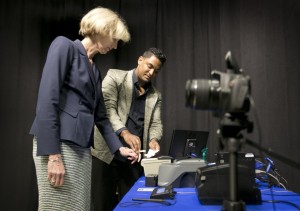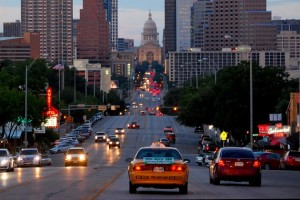Uber and Lyft Inject Corporate Money into Austin Politics
If you’ve used a taxi or similar transportation service in a major U.S. city recently, you’ve probably heard of Uber or Lyft. Uber and Lyft are two mobile ride hailing companies that were both founded in San Francisco, California. Uber was founded in March 2009 and Lyft was founded in summer 2012. They facilitate peer-to-peer ridesharing and operate under the transportation network company (TNC) label. By summer 2015, Uber’s net worth was valued at $50 billion and Lyft’s net value was $2.5 billion.

Uber and Lyft are great options for carpooling, for not having to deal with parking your car downtown, or for worrying about drinking and driving. They also provide convenience by simply using your smartphone to order and pay for a ride. So what’s all the fuss with them about? This past December, the Austin City Council passed an ordinance that, among other things, required all transportation network companies (TNCs), which includes Lyft and Uber, to fingerprint their drivers for background checks. The December ordinance set benchmark goals of having 25% of drivers fingerprinted by May 2016, with gradual increases, and then 99% compliance by February 2017.

Public safety officials support of the fingerprinting ordinance as necessary for safety. Without fingerprinting, drivers could slip through the background check using false identities. Lyft and Uber are opposed to fingerprinting their “contractors” because they think their background checks are sufficient and that the ordinance opens the door to future regulation that they believe hampers innovation. Taxi drivers, pedicab operators and horse carriage operators are already subject to the same regulations though.

Lyft and Uber say that if fingerprinting happens, they’re leaving town. They don’t want to be subjected to regulations they think might stifle future business decisions or that defines them as taxi-like companies. If they’re associated with taxi services, they’ll be subjected to an array of additional rules. This is ironic because Uber and Lyft are in fact very similar to taxis: they provide transportation for passengers and receive payment in exchange. They are “taxi-like” and thus should be subjected to the additional regulations they want to avoid.
What about who the actual drivers are? According to Ben Wear (Austin American Statesman February 15, 2016, pg. B3):
At least ten Austin women filed complaints last year about sexual assaults – seven against ride-hailing drivers, three involving taxis. While the two companies use background checks that look at all 50 states, and they bar applicants with crimes of violence or theft, those background checks only look back seven years. So, someone could have committed a rape or even a homicide 10 or 20 years ago, even in Texas, and the ride-hailing companies likely would not find out about it.
In an undercover investigation, NBC Chicago hired several drivers and ran their own personal background checks on them. They found numerous tickets and questionable driving history. One driver had 26 tickets and one driver was an ex-con who had priors going back two decades including burglary, drugs, and assault. There are clearly people getting through their background check system that shouldn’t be driving for hire. Having the fingerprint submissions that the City Council proposed would make it easier for law enforcement to identify lawbreakers.
A political action committee (PAC) called Ridesharing Works for Austin formed in response to the fingerprinting mandate. The PAC made a petition to fight back against the City Council’s new TNC rules, and they gathered three times more signatures than they needed. The City Council could then either overturn the fingerprinting ordinance passed in December, or place it on the ballot of the next available election for the voters to decide. They went with the latter, so it’s up to Austin voters to decide on May 7.
The Uber and Lyft situation in Austin is a local example of a problem America is experiencing at a federal level – big money in government. The reason Uber and Lyft were able to gather so much support for their petition is because they contributed at least $50,000 in cash and services to the Ridesharing Works PAC. The PAC had canvassers go out, knock on Austin residents’ doors, and gather signatures. Many rideshare drivers also had the petition available in their vehicles for passengers to sign during their rides. Many inaccurately explained the issue to Austin residents as simply “Uber/Lyft vs. the city of Austin”. They told residents that the City Council is forcing Uber and Lyft to leave town, when in reality, if the two companies do leave, it’ll be on their own accord.
The money behind the petition against the fingerprinting ordinance is from big corporations. And those corporations are essentially funding Lyft and Uber’s campaign against safety regulations in Austin. This is exactly what we want to avoid in politics, and it’s happening right here in our city. Corporations coming up with their own rules and going to city hall to demand them is not the way government is supposed to work. It’s a government by the people and for the people, not by corporations and for corporations. If Uber and Lyft succeed in getting the fingerprint mandate overturned, it sets a dangerous precedent for the future. As citizens of the United States of America, we need to question how money from big corporations like Uber and Lyft is influencing our local legislation. Austin voters should consider this when they head to the polls on May 7th.